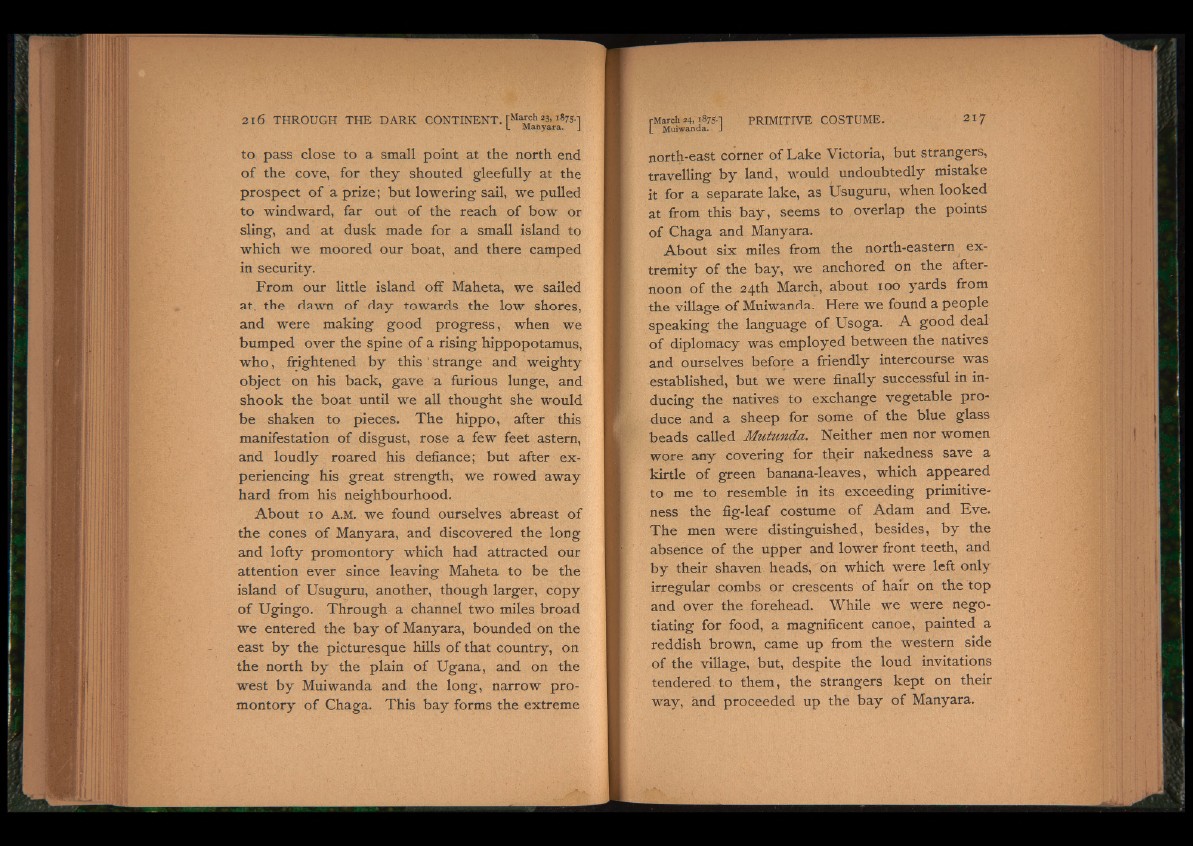
to pass close to a small point at the north end
o f the cove, for they shouted gleefully at the
prospect o f a prize; but lowering sail, we pulled
to windward, far out o f the reach o f bow or
sling, and at dusk made for a small island to
which we moored our boat, and there camped
in security.
From our little island off Maheta, we sailed
at. the dawn o f d ay towards the low shores,
and were making go od progress, when we
bumped over the spine o f a rising hippopotamus,
w h o , frightened b y this strange and weighty
object on his back, gave a furious lunge, and
sh o o k the boat until we all thought she would
be shaken to pieces. T he hippo, after this
manifestation o f disgust, rose a few feet astern,
and loudly roared his defiance; but after e x periencing
his great strength, we rowed away
hard from his neighbourhood.
A b o u t io A.M. we found ourselves abreast o f
the cones o f Manyara, and discovered the long
and lo fty promontory which had attracted our
attention ever since leaving Maheta to be the
island o f Usuguru, another, though larger, cop y
o f Ugingo. Through a channel two miles broad
w e entered the b a y o f Manyara, bounded on the
east b y the picturesque hills o f that country, on
the north b y the plain o f Ugana, and on the
west b y Muiwanda and the long, narrow promontory
o f Chaga. This b a y forms the extreme
north-east corner o f Lake Victoria, but strangers,
travelling b y land, would undoubtedly mistake
it for a separate lake, as Usuguru, when looked
at from this b a y , seems to overlap the points
o f Chaga and Manyara.
Ab ou t s ix miles from the north-eastern e x tremity
o f the bay, we anchored on the afternoon
o f the 24th March, about 100 yards from
the village o f Muiwanda. Here we found a people
speaking the language o f Usoga. A good deal
o f diplomacy was employed between the natives
and ourselves before a friendly intercourse was
established, but we were finally successful in inducing
the natives to exchange vegetable produce
and a sheep for some o f the blue glass
beads called Mutunda. Neither men nor women
wore any covering for their nakedness save a
kirtle o f green banana-leaves, which appeared
to me to resemble in its exceeding primitiveness
the fig-leaf costume o f Adam and Eve.
T he men were distinguished, besides, b y the
absence o f the upper and lower front teeth, and
b y their shaven heads, on which were left only
irregular combs or crescents o f hair on the top
and over the forehead. While we were negotiating
for food, a magnificent canoe, painted a
reddish brown, came up from the western side
o f the village, but, despite the loud invitations
tendered to them, the strangers kept on their
way, and proceeded up the b a y o f Manyara.